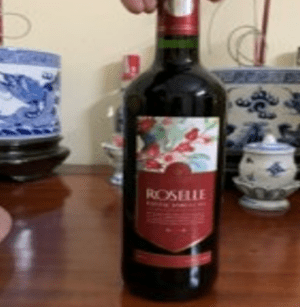By Prof. Raphael Nyarkotey OBU
Hibiscus wine
Communion wine, also known as sacramental or altar wine, is specifically produced for use in religious ceremonies. The market for these wines is specialised, with various suppliers offering different types and price points.
Recently, I had a discussion with a pastor who expressed concern about the exorbitant prices of foreign-imported communion wines for churches. In light of this, I advised that we explore local alternatives. One such alternative I propose is Sobolo.
Traditionally, communion wine is made from fermented grape juice, and it may or may not contain alcohol depending on the denomination or preferences. The basic ingredients are:
- Grapes: Typically red or black grapes are used, as they are rich in natural sugars for fermentation.
- Yeast: Natural or added yeast ferments the sugars in the grapes to produce alcohol (in alcoholic versions).
- Water: Sometimes added for dilution in certain preparations.
- Preservatives: Non-alcoholic versions may include mild preservatives to prevent spoilage. Some churches prefer non-alcoholic communion wine, which is essentially grape juice.
Health benefits of communion wine (moderate use)
- Rich in antioxidants:
- Red grape-based communion wine contains resveratrol, a powerful antioxidant that helps fight free radicals and reduces inflammation.
- Cardiovascular health:
- Moderate consumption of wine (specifically red wine) has been linked to improved heart health by increasing good cholesterol (HDL) and reducing bad cholesterol (LDL).
- Digestive aid:
- Grape juice or fermented wine can support digestion due to the presence of polyphenols.
- Immune-boosting properties:
- The natural compounds in grapes, such as flavonoids, may strengthen the immune system.
- Stress relief:
- For alcoholic communion wine, small quantities can promote relaxation and reduce stress.
- Natural nutrients:
- Grape-based wines provide small amounts of vitamins (like Vitamin C) and minerals (like potassium).
Price range:
- 750ml bottles: Prices typically range from US$6 to US$10 per bottle. For example, San Antonio Winery’s Sacramental Communion Red from California is priced at approximately US$6 per 750ml bottle (Wine-Searcher).
- Cases of 12 (750ml bottles): A case of 12 bottles can cost between US$75 and US$90, depending on the wine’s type and producer. For instance, Cribari’s Light Muscat Sacramental Wine is available for US$81.48 per case.
- Larger volumes (3l to 4l): Larger containers, such as 3-litre or 4-litre jugs, are priced between US$90 and US$110. Mont La Salle offers a 4l Haut Sauterne Altar Wine for US$94.50.
Suppliers:
- Church supply warehouse: Offers a variety of altar wines, including Mustum Sacramental Grape Juice (12 bottles of 750ml each) for US$95.50 and Angelica Altar Wine by Mont La Salle for US$104.50.
- Catholic supply of St. Louis, Inc.: Provides a selection of altar wines, such as La Salle Altar Wine 4l Haut Sauterne priced at US$94.50 and Mont La Salle Altar Wine 3l ranging from US$102.50 to US$110.50.
- F.C. Ziegler Company: Offers various sacramental wines, including Light Muscat Sacramental Wine (750ml) for US$81.48 per case and Mustum 100 percent Grape Juice (non-alcoholic, 750ml) for US$90.00 per case.
Why sobolo should replace communion wine
- Support for local agriculture
- Sobolo is made from locally grown hibiscus flowers, ginger and other spices that are abundant in Ghana.
- This transition would increase demand for these crops, providing farmers with a stable market and boosting the agricultural sector.
- Regions like the Northern, Upper East and Volta, where hibiscus grows well, would experience economic upliftment, reducing poverty in these areas.
- Reduced import dependency
- Most communion wines used in Ghana are imported, requiring foreign currency. Switching to Sobolo would significantly reduce the country’s reliance on imports, saving millions in foreign exchange and strengthening the cedi.
- Ghana could redirect these savings into local industries, infrastructure and agricultural development.
- Job creation and industrial growth
- A shift to Sobolo would stimulate local production, leading to the establishment of small and medium-scale processing plants to produce standardised Sobolo for churches.
- This would create jobs across the value chain, from farming and processing to packaging, transportation and sales.
- Affordable option for churches
- Sobolo is cheaper to produce than communion wine. Churches, especially in rural areas, would find it more accessible, reducing their expenses and enabling them to redirect funds toward community development projects.
- Global export potential
- Ghana could package Sobolo as a unique African sacramental drink for export to churches worldwide.
- Proper branding and certification would open up new markets, earning foreign exchange and boosting the economy.
- Health and social benefits
- Sobolo is a non-alcoholic, nutritious drink, making it suitable for all church members, including children and abstainers.
- Its rich antioxidants promote good health, potentially reducing healthcare costs linked to alcohol-related illnesses.
- Promoting Ghanaian identity
- Using Sobolo in religious ceremonies aligns with Ghanaian traditions and showcases local ingenuity. This shift would reinforce cultural pride while demonstrating how indigenous resources can be leveraged for economic growth.
Economic boost for Ghana
- Agricultural development
- Increased demand for hibiscus and related ingredients would lead to expansion in farming activities, increasing farmers’ incomes and reducing unemployment in rural areas.
- Processing industry growth
- The need for large-scale Sobolo production would drive investment in food processing industries. This includes drying, extraction and packaging of hibiscus flowers, creating new business opportunities.
- Tax revenue for the government
- A formalised Sobolo industry would generate tax revenues from manufacturers, distributors and exporters.
- Empowering local entrepreneurs
- Many women in Ghana are involved in producing and selling Sobolo. Institutionalising its use as a communion drink would empower these entrepreneurs, contributing to economic inclusion and gender equality.
- Foreign exchange savings and earnings
- Sobolo, as a substitute for imported wine, could save Ghana millions in foreign exchange annually. Additionally, exports of Sobolo to African and global churches could earn substantial foreign currency.
- Tourism and branding opportunities
- Ghana could market Sobolo globally as a cultural symbol, attracting tourists and investors interested in local beverages.
Implementation steps
- Standardisation and certification
- Establish clear guidelines for producing and packaging Sobolo for religious purposes to ensure quality and safety.
- Government support
- Offer subsidies or incentives for farmers and processors involved in Sobolo production.
- Religious advocacy
- Collaborate with church leaders to promote the adoption of Sobolo as a communion drink.
- Export development
- Create partnerships with international distributors to market Sobolo globally as a uniquely Ghanaian product.
Comparison of sobolo wine and communion wine
Sobolo wine
- Definition: Sobolo wine is a fermented or non-fermented drink made primarily from hibiscus flowers (roselle), with added spices like ginger, cloves and sometimes sweeteners. It is a non-alcoholic or mildly alcoholic beverage depending on the preparation.
- Key ingredients:
- Hibiscus flowers
- Ginger
- Sugar (optional)
- Cloves, cinnamon or other spices
- Cultural significance:
- A traditional Ghanaian drink often consumed during festivals, social gatherings and everyday life.
- Represents local innovation and cultural pride.
- Health benefits:
- Rich in antioxidants: Helps combat oxidative stress.
- Lowers blood pressure: Hibiscus has proven benefits for hypertension.
- Immune Booster: Contains Vitamin C and other nutrients.
- Economic impact:
- Boosts local agriculture (hibiscus farming).
- Promotes local industries (processing, packaging, distribution).
- Offers export potential as a uniquely African beverage.
- Suitability for communion:
- Non-alcoholic, making it accessible for all church members.
- Locally sourced and culturally relevant for African churches.
Communion wine
- Definition: A wine made from fermented grapes, traditionally used in Christian religious ceremonies, particularly the Eucharist. It is symbolic of the blood of Christ.
- Key ingredients:
- Grapes
- Yeast (for fermentation)
- Preservatives (optional, for non-alcoholic versions)
- Cultural significance:
- Rooted in Christian tradition, derived from biblical accounts of the Last Supper.
- Associated with European and Middle Eastern winemaking traditions.
- Health benefits:
- Antioxidants: Red wine contains resveratrol, which supports heart health.
- Stress relief: Alcohol in wine can provide relaxation in small amounts.
- Economic impact:
- Often imported into Ghana, contributing to foreign exchange loss.
- Limited impact on local agriculture or industries.
- Suitability for communion:
- Accepted by many denominations, though alcoholic content may pose challenges for certain members.
- Imported wine can be expensive, especially for rural or low-income churches.
Key differences
| Feature | Sobolo wine | Communion wine |
| Basic ingredient | Hibiscus flowers and local spices | Grapes |
| Alcohol content | Non-alcoholic or mildly alcoholic | Alcoholic (or non-alcoholic grape juice) |
| Cultural relevance | Traditional Ghanaian drink | Imported and tied to Christian tradition |
| Cost | Affordable and locally produced | Expensive due to import costs |
| Economic impact | Boosts local agriculture and jobs | Minimal impact on local economy |
| Health impact | Rich in antioxidants, lowers BP | Contains antioxidants, but alcohol risks exist |
Why sobolo wine could be a better option for Ghanaian churches
- Economic advantages: Sobolo supports Ghana’s local economy by boosting agriculture and creating jobs.
- Health and accessibility: Sobolo is healthier and inclusive for all members, especially children and abstainers.
- Cultural pride: Using Sobolo reflects Ghanaian innovation and promotes cultural identity within the church.
While communion wine is tied to Christian tradition, replacing it with Sobolo aligns with Ghana’s economic and cultural needs without compromising the symbolic essence of the Eucharist.

In conclusion, replacing communion wine with Sobolo is a win-win strategy for Ghana. It reduces import reliance, strengthens the local economy, empowers farmers and entrepreneurs, and creates export opportunities. By aligning economic growth with cultural heritage, Sobolo has the potential to revolutionise both the church and the Ghanaian economy.
>>>The author is a Professor of Naturopathy, a Gambia-trained Lawyer and a Chartered Health Economist. e-mail: [email protected]










